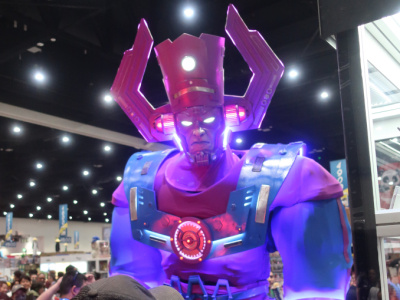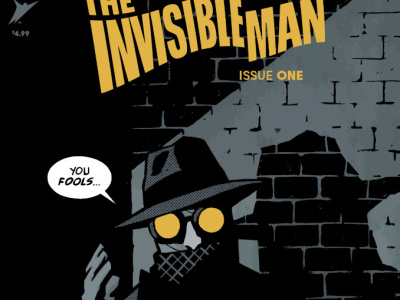 ICv2 sat down with Viz Media CTO Gagan Singh to talk about the digital landscape for manga and Viz’s place in it, which is rapidly evolving. This week, Viz titles are beginning to appear in Apple’s iBookstore, the latest in a major expansion of digital availability for Viz manga titles.
ICv2 sat down with Viz Media CTO Gagan Singh to talk about the digital landscape for manga and Viz’s place in it, which is rapidly evolving. This week, Viz titles are beginning to appear in Apple’s iBookstore, the latest in a major expansion of digital availability for Viz manga titles.In Part 2, we talk about the day and date release with japan, the competition with pirated content, and the future of digital manga. In Part 1, we talked about the digital ecosystem for Viz content, the roles of the different channels, and the reasons for key decisions in moving to digital.
How do you accomplish day and date digital release? Can you walk us through the process?
We do get assets early, obviously to prep from Japan. We have an amazing editorial and production team in place, and the same goes for Shonen Jump Magazine, the team that works for me. We release the Shonen Jump Magazine the same day as it is in Japan. It’s a process that’s very tedious and a lot of work goes into making sure it’s approved.
How long do you have to turn it around?
For the magazine we have a few weeks.
Despite the day and date release with Japan, you still get beat by pirates and scanlators, so somewhere in the Japanese distribution chain, product or files are being diverted. Do you fix that or is it something you’re working on?
I don’t know how you would fix it without fixing the supply chain. There are thousands of distributors just within Japan who get access to this content a week or a few days in advance. I think we would drive ourselves crazy trying to nail down every single one of those sources.
Animation is a little easier. Hollywood has addressed this where every movie theater has a unique signature on the screen, you just don’t see it. If you watch a DVD that’s bootlegged you can actually see which theater it came from. You can then go to that theater owner and hold them liable for that pirated content.
But if I pick up a book and scan it and put it online, and through the community I can get the content translated, there’s no way to find out where it came from.
Is there any thought to putting out digital files earlier than the print editions are released in Japan?
I think tradition in Japan is so entrenched that it would be a long time before that would come to reality.
Over the past two years do you think any progress is being made against pirates and scanlators?
I don’t think so.
There has been some content taken down.
Sure. We very actively go after pirate sites based in the United States, but the fact of the matter is that particularly with Shonen Jump, they’re all over the place and in a lot of these countries you run into jurisdiction issues and processes are not as easy as they might be in the U.S. so there’s just not a lot you can do. That doesn’t mean you don’t do anything about it. We try to engage our community on it.
It is amazing how many fans do not actually realize what it does to the artist when the artist is cut of out the arrangement. We try to make that a point as well. In each of our panels, we try to emphasis that yes you can get all this stuff, but if you care about this content and want to continue having it, you should purchase it from legitimate sources. We don’t care if you come to us or some of our partners.
But I don’t personally believe you can shut it down through legal means. It would require the entire industry and a very concerted effort to go after this. The best you can do is education; you can’t shut down the supply chain.
If the solution is to change consumer behavior then making more content available faster, so there’s a legitimate source for content that was being pirated, is important. Did that help?
For Shonen Jump, a little bit, but they get ahead of it. They get a copy of it before, and we can’t release until it’s released in Japan. So you can’t win that battle in a legally enforceable way.
What portion of the international scene is Viz Media--how do the territories get broken up?
We sell books in the UK , Australia, New Zealand and Canada. We most recently launched Shonen Jump in Ireland and South Africa in addition to the other territories where we sell print books. That is the extent of our digital footprint. Our books are also sold in English in the Philippines. Kaze and Viz Media Europe, which is sort of our sister company in Europe, they have most of the European territories in French, German.
So if someone wants to buy a Viz title in English, in France where can they go?
I don’t think it exists. I think you buy it in French.
The digital graphic novel market is currently fragmented on multiple platforms, which is probably not ideal for consumers. Where do you see that going, and more generally, where do you see the future of digital going for manga?
Our digital future won’t be any different from e-books. The entire industry is moving in a similar direction. Now the basic capabilities for delivery are pretty even across buying a novel or a graphic novel. That playing field is now level.
There is a lot of curiosity about where the device ecosystem will evolve to. Nook has had its share of interesting news. Kindle is making great strides. Rakuten is making huge investments in making Kobo a device ecosystem around the world. It will be interesting to see what the consumers respond to.
The good news for me as a publisher is the cost to me to be on any of these platforms is not that significant. Once I have the file format worked out, you upload it and you’re done. It’s not like I have to go talk to five different vendors. I don’t spend a lot of time on trying to place bets on which device or system would succeed and which one wouldn’t because the marginal costs for us to deliver on any of these platforms is not that significant.
What I care more about is whether there enough people in the next generation reading manga. That’s the higher order problem that as manga publishers we should be concerned with. I think the digital stuff will just take care of itself.
There will continue to be innovation--Amazon just launched an interesting thing called Book Match where if you buy a print version, you can get the digital version quite cheaply. So there will continue to be more innovation, not necessarily in the screens and gizmos, but I think more around business models.
As long as our content is being read, we are happy to take a back seat and follow the industry. Outside of optimizing the user experience and making sure our readers get to the content they want to read as soon as possible, we don't necessarily need to break any new ground in innovation as far as distribution is concerned.
We have our app ecosystem, it works well and we can optimize it further and make it better to make it more personalized and so forth, but in the general ebooks story I’m more interested in, there are two main things: Are people going to continue reading manga? I hope they will. The other one is do we hit a plateau at some point where a certain percentage of the population will always prefer print and a certain percentage will always prefer digital?
Do you think it’s generational?
There was a report out last week that children are reading a lot less children’s books, Kids are reading a lot less than they were 10 years ago. I suspect that as a nation, we have a reading problem, but it’s anecdotal. I don’t really have any convincing data.
I think the next real question is what percentage of those in the next generation grew up reading online for free and are they willing to pay for it?
My favorite example is when you’re in the digital domain, your biggest competition is not the next manga or the next book, your biggest competition is Angry Birds because it’s only one click away. When you get into debate over mind share, I’m not just trying to get them to read the next book, I’m trying to get them to not listen to that song or play that videogame. That is a bigger challenge where marketing and mind share is concerned.
Distribution is starting to get commoditized now--it’s not as hard to go build a reader today as it was three years ago. Distribution itself is not as exciting, what is exciting is to see what new business models emerge and maybe even take on things like piracy at that point.
Click here to go back to Part 1.








